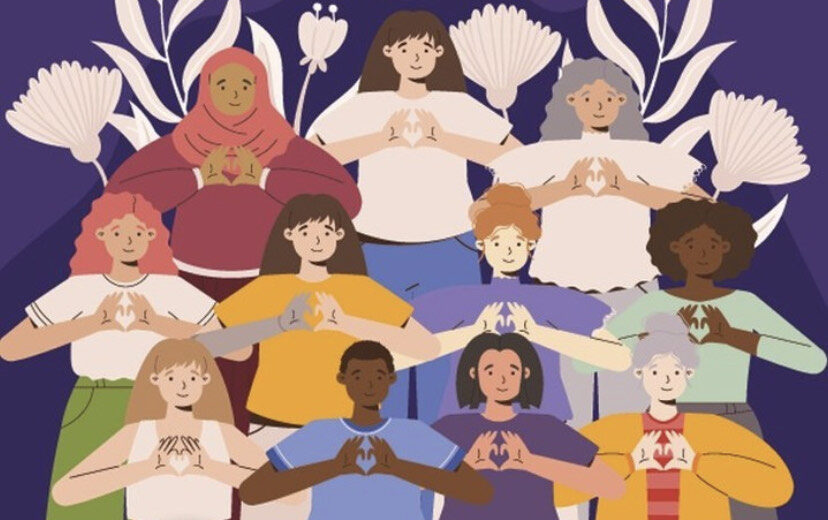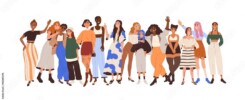Every year, on the 8th of March, the world marks International Women’s Day. It’s a day dedicated to recognising female achievements and a call to action encouraging everyone to stand up for gender equality. The celebration originated in March 1911 as a way of honouring the 1908 garment workers’ strike in New York, where women protested against working conditions and demanded equal political and economic rights.

On International Women’s Day, women are celebrated without regard to divisions, whether national, ethnic, linguistic, cultural, economic, or political. Inclusion is, therefore, a keyword for this event, and that’s why “Inspire Inclusion” is the campaign theme chosen by the United Nations this year.
But what does it mean to truly inspire inclusion?
Firstly, this term emphasises the importance of diversity in all aspects of society, irrespective of religion, culture, skin colour or gender orientation.
Secondly, it requires forging women’s empowerment and promoting the presence of women in leadership and decision-making positions. Women represent half of the global population. Yet, they face barriers when trying to achieve leadership roles, especially those belonging to underrepresented groups. Only by considering diverse perspectives can organisations and communities make better decisions.
This objective is set by the Women’s Equality Party. WE is a feminist minor party in the UK which unites people of all genders, ages, backgrounds, ethnicities, beliefs and experiences. They aim to create a future where gender equality is the norm, highlighting that women’s equal participation in politics leads to better outcomes for society.
From an economic perspective, inclusion can be promoted by addressing barriers such as unpaid care work. The term refers to unpaid time spent on activities within a household for its members including cooking, cleaning, child-rearing, and other gender-assigned tasks that are rarely adjusted when women take on work roles. Quality and affordable social care services and shifting social norms on responsibilities and time dedicated to unpaid care work can ease the burden on women. It would also foster their economic empowerment, as unpaid care work contributes to the gender pay gap.
To inspire inclusion it becomes crucial to support women in STEM (Science, Technology, Engineering, Mathematics) education, showcasing to young girls that it offers better prospects and more career choices. Additionally, promoting creative and artistic talent, as well as participation in sports, is essential. A non-profit organisation based in London that fights against gender inequalities within the sports sector is, for example, Women in Sport. Similarly, the Italian association Assist is committed to countering harassment and abuse in the world of sports, raising awareness on all issues concerning equal rights and equal access.
International Women’s Day calls for action to challenge stereotypes, break down barriers, and create environments where all women are valued and respected. The theme chosen by the United Nations this year, in particular, encourages everyone to recognise the importance of women for progress, including those from marginalised communities.
However, despite this celebration being introduced more than one century ago, the world is far from achieving gender equality. This day should serve as an occasion for collective global activism, but it often turns into a marketing opportunity. Brands capitalise on this celebration by promoting discounts and limited-edition products, in the same way they do for Valentine’s Day or Mother’s Day. The capitalist takeover of International Women’s Day is evident in the boosting of sales experienced by flower shops, where bouquets are often associated with a symbol of appreciation and love towards women. Not to mention free disco entries, pay-two-take-three promotions on drinks, or feminist merchandise available from fast-fashion brands, many of which have been accused of subjecting their employees to terrible working conditions.
The question that arises is: are fashion t-shirts promoting feminism aligned with true feminist values? Unfortunately, most female workers who created those tees are not earning a living wage.
A curious example of capitalism jumping on the feminist bandwagon for 8th March comes from Italy, where, two days ago, three new ice cream flavours were launched by Confindustria (the General Confederation of Italian Industry) in Genoa. The declared intention was to spotlight gender equality by associating women with the concept of wonder. How the wonder coming from eating ice cream can be linked to gender rights remains a bizarre combination. More likely, Confindustria exploited the event and used the excuse of female empowerment to instead promote local products and tourism.
The over-branding of IWD threatens to dilute the real meaning of this day. This is also true because International Women’s Day was born in a socialist spirit. As said, the first Women’s Day originated to commemorate the socialist resistance in New York that in 1908 saw 15.000 working women marching through the city demanding better pay, shorter working hours and voting rights. From a protest against capitalism, the event has now become a capitalist tool to make more money.
Yet, it must be recognised that some brands are putting real effort into driving change. One of the most significant examples in 2024 is Lululemon, an athletic apparel retailer that started a 6-day women’s ultramarathon in celebration of International Women’s Day. This campaign is part of its “Further” initiative, aimed at showcasing how far women can go with support and access to resources and product innovations typically reserved for men. Not only has the company developed new products with and for female athletes; they are also making a US$1.5 million contribution to Girls Opportunity Alliance, focused on empowering adolescent girls globally through education and well-being tools.
On our side, at Wempower, we inspire inclusion every day. We are a network of journalists based all over the world, from different cultures and religions, and for us, every story matters, regardless of religion, culture, colour of skin or gender orientation. We promote empowerment by challenging the stereotypical representation of women in the media. We are also helping young women from underrepresented groups who aspire to become journalists realise their dreams. Our goal is to rewrite the narrative about gender issues and women’s rights with a different perspective, made up of positive, inclusive and powerful stories of women fighting every day against discrimination.


